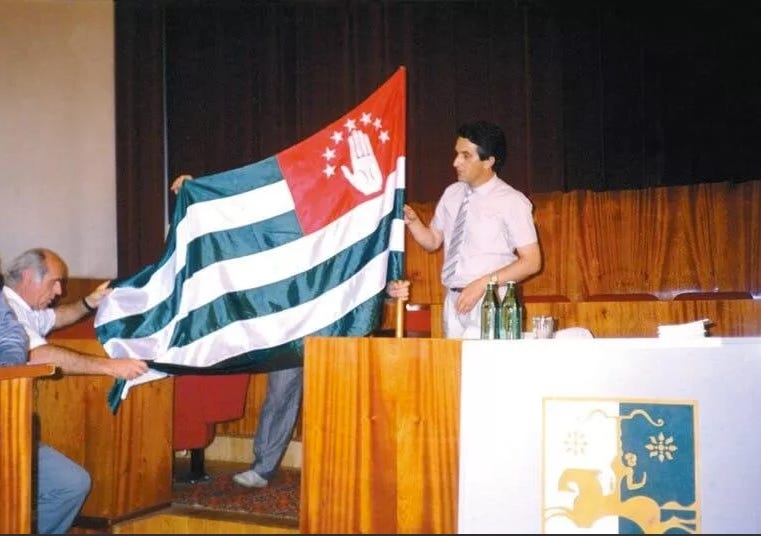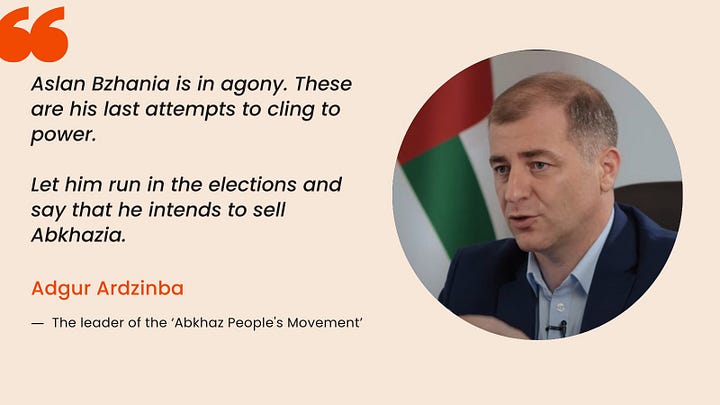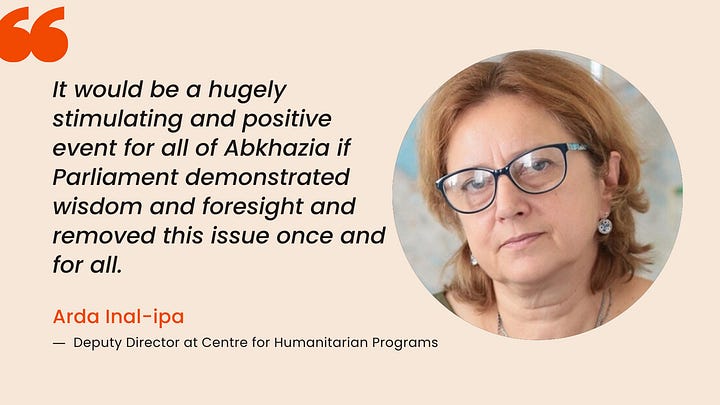Welcome to Abkhazia Weekly Brief — Issue 14.
Firstly, I would like to address the delay in this week’s newsletter. Normally, you would have received this on Sunday, but circumstances prevented its timely release. As the administrator of AW, I juggle many responsibilities both for AW and my personal and professional commitments. Whilst I strive to maintain a consistent schedule, there are times when unforeseen challenges arise.
Last week was particularly busy in Abkhazian current affairs, especially regarding the ongoing nationwide protests against the proposed “apartment bill”. Whilst I managed to share the main updates about this issue, I couldn’t complete the full Weekly Brief. I sincerely apologise for this delay and appreciate your understanding. Moving forward, I will continue to do my best to deliver the newsletter every Sunday, but I kindly ask for your patience if occasional delays occur.
Now, let’s return to the current events in Abkhazia. The Republic of Abkhazia marks its National Flag Day on 23rd July. Officially adopted in 1992, our national flag is more than just a symbol of the modern state—it embodies centuries of Abkhazian history and statehood. Today, it stands as a powerful representation of Abkhazians’ freedom and independence, honouring the long struggle of our people across generations. You can read the details of the journey of how Abkhazia got its flag, how it was made, and what it symbolises on AW: A Nation's Emblem: Abkhazia Celebrates Its Flag's Rich History

In this issue, we will continue to focus on the ongoing protests against the draft “apartment law”, providing you with the latest developments and analyses.
The past week has been dominated by the government's renewed efforts to legalise apartment construction, a contentious issue since President Aslan Bzhania’s (one finds it increasingly difficult to call this man ‘president’) initial proposal in July last year. Despite public opposition, Bzhania recently reintroduced the concept within a bill ostensibly aimed at aiding Eastern Abkhazia.
On 17th July, tensions escalated as the parliamentary committee met to discuss the president's initiative. Security forces were heavily deployed, and public representatives were barred from the proceedings. The situation grew volatile, with altercations between protesters and security personnel, and even an incident involving gunfire from a civil activist.
Inside parliament, Bzhania clashed with deputies, notably Kan Kvarchia, who was forcibly removed. The president departed abruptly, leaving his supporters to advance the bill.
Bzhania's guards forcibly removed deputy Kvarchia from the parliament, denying him any opportunity for redress.
Clashes erupted outside, with civil activist Dzhansukh Adleiba firing shots into the air.
Dzhansukh Adleiba was arrested for 30 days for firing shots near the Parliament building, according to the press service of the Sukhum City Court. He faces charges of “Hooliganism” – a severe breach of public order involving the use of a weapon or objects used as weapons. Adleiba will remain in custody until 17 August.
Security forces forcibly removed war veterans, former deputies, and barred independent and foreign journalists, allowing only state and Russian media to cover the session. Bzhania ignored the deputies and left, delegating the bill’s promotion to his supporters in the parliamentary committee.
Valery Bganba and Valery Kvarchia, former parliamentary speakers, held a press conference in Sukhum, highlighting the infrastructural issues and previous rejections of similar bills aimed at changing Abkhazia's demographic. They noted the interests of Russian businessmen lie along the coast, not in the proposed construction areas.
Deputies opposing the president, including Dmitry Marshania, Badra Piliya, Kan Kvarchia, Demur Gogia, Inal Gitsba met with constituents who supported their stance against the bill. Bagrat Khutaba, head of “Strong Spirit of Abkhazia” and the President’s Special Representative for Middle Eastern Affairs, also voiced his opposition during a press conference.
“We will not abide by laws that violate the interests of Abkhazia! We need laws that protect the Abkhaz nation!” — Bagrat Khutaba
On 19 July, eight deputies publicly pledged in Sukhum’s Freedom Square not to vote for the unpopular “apartment law.” This triggered further meetings with voters in Ochamchira, Sukhum and Gagra, with more planned. In Ochamchira, over 5,000 people protested against President Bzhania's proposed “apartment” law. Residents voiced their outrage over the legislation, while opposition leaders warned against trading land for money, likening it to the situation in Palestine.
Aslan Bzhania, the bill’s initiator, faces widespread public distrust and has been largely ignored. With the presidential campaign six months away, his only support comes from his corrupt entourage and loyal security forces.
However, there is hope amid these dark times. Bzhania’s actions, though problematic, have unintentionally paved the way for political progress by uniting society around an idea rather than a person. It is now up to civil society to decide the country’s future direction.
Vice President Badra Gunba supports the draft “apartment” law believing it will address regional development imbalances if passed by Parliament. At a meeting in the President's Administration, Gunba stated, “I fully support this well-developed draft, which addresses all potential risks and concerns. It is surprising that the discussion has become politicised, especially given that those who previously supported the sale of residential property now oppose a risk-free law.” Gunba emphasised that the law poses no threat to national security.
Prime Minister Alexander Ankvab also backs the draft law. At a meeting in the President's Administration, Ankvab stated, “This meeting leaves a very positive impression. Such discussions are crucial not only for contentious laws but for decision-making by both executive and legislative branches. We take pride in our democracy, despite some growing pains, and value the opportunity to speak openly. It’s worth noting that the former Abkhazian Soviet Socialist Republic was not self-sufficient, producing only up to 12% of consumables and 6% of industrial goods. Where did the rest come from?”
As Izida Chania reports, “Aslan Bzhania wants this bill approved by 1 August, before the deputies go on recess. Officials overseeing “investments” are being enticed by the ever-growing sums of money promised by the president, which have mushroomed from 150 billion to 300 billion, and now 500 billion in just two years. Appetite grows with eating, and Bzhania’s reliance on the corruption within his entourage is proving effective. He is actively supported by municipal leaders, who were at the forefront on 19 July, “protecting” the Ochamchira District’s House of Culture from its residents under the guise of security forces and various criminal elements. This was a clear example of how the authorities have become intertwined with crime.”
Representatives from several public and political organisations have called for open debates on state television, scheduled for 22 July 2024, to discuss this issue, but they haven’t received any response.
The Federation of Abkhazian Associations in Türkiye (ABHAZFED) has expressed concern over the draft “apartment law” in Abkhazia. They urge a review by a commission within the People’s Assembly, involving universities, political parties, and civil society organisations, to ensure transparency and social consensus. ABHAZFED also warns that selling housing to foreigners could harm efforts to preserve Abkhazian languages and cultures.
In a recently released statement, the Union of Intellectuals of Abkhazia strongly opposes the draft “apartment law” under consideration by Parliament. The Union calls on Parliament to reject the law and establish a full moratorium on the sale of apartments to foreigners, highlighting the risks posed by foreign developers. They also urge the government to address urgent issues like demographics, state language deterioration, drug addiction, traffic accidents, and environmental concerns.
Tsiala Gadlia: “Who can guarantee that our children and grandchildren will live freely on their own land? When Aslan Bzhania opened his Tamishi base, he promised that locals would work there. Go and see how many locals actually work there! Aslan Bzhania is ready to sell everything for money, and we must stop this.”
Tsiala Gadlia is a war veteran of the Georgian-Abkhazian war of 1992-93 and was awarded the Medal “For Courage.” This honour was personally bestowed upon her by Vladislav Ardzinba.




Viacheslav Chirikba, former Foreign Minister of Abkhazia, Director of the Centre for Strategic Studies under the President of Abkhazia, Doctor of Philology, and Professor, spoke at a meeting of scholars and staff of the Abkhazian Institute of Humanities. He voiced his opposition to the adoption of the apartment law and called for a moratorium.
A press conference on the draft law regarding the construction of apartments will be held on Wednesday, 24th July, at 12:00. The participants include Kan Kvarchia, Adgur Ardzinba, Leonid Chamagua, Ilya Guniya, and Leuan Mikaa. The event will take place at the ApsnyHabar press centre, located at 4 Abazinskaya Street.
Important note
Please remember to follow AW's social media accounts (especially X, Facebook, and Telegram) for the latest developments regarding the draft apartment law. Barring any unforeseen circumstances, Issue 15 of Abkhazia Weekly Brief will be with you on Sunday.
Meanwhile, we are striving to manage numerous projects with very limited resources, and we have many more planned. Whilst we previously used only a few programmes requiring domain, hosting, and annual memberships, today we utilise many different platforms that are fee-based, and we are struggling to cover these costs. For instance, we had to suspend our recently launched podcast broadcasts due to the platform's fee requirements. And projects much larger than these are waiting to be continued and initiated.
AbkhazWorld.com and all related projects are sustained solely through individual support, without any aid from organisations. For over 15 years since AW's inception, we have received support for numerous projects and our work. However, these contributions have typically come from the same individuals. These people have already done their utmost to help, and we cannot ask more of them.
If you find our work valuable, please consider supporting AW or at least share this message with those you think might be able to help. Should you have any suggestions or requests, you can reach us at info@abkhazworld.com.
You can support our work with a one-time donation or monthly subscription.
PayPal: https://www.paypal.com/donate/?hosted_button_id=KZMKPDZHLYVDA
Paypal email: abkhazworld@gmail.com (You don't need to have a PayPal account – no registration needed.)
Buy me a coffee: https://www.buymeacoffee.com/abkhazworld
Patreon: https://www.patreon.com/AbkhazWorld
Subscribe Substack: https://abkhazworld.substack.com
Thanks and hoping to share another issue on Sunday. Have a great day and a wonderful week!






